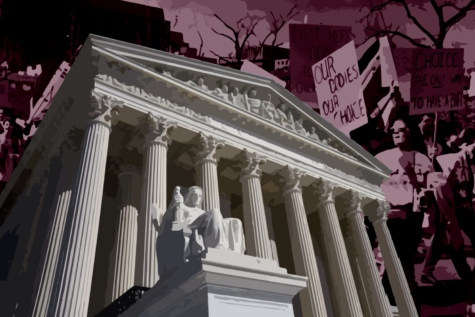OPINION | Supreme Court ruling threatens abortion access
December 8, 2021

On Dec. 8, the U.S. Supreme Court will make its decision on whether or not to uphold a Mississippi law that would ban abortions after 15 weeks. With three newly appointed justices, all nominated by former President Donald Trump, it seems that there is a high chance that the Court will rule in favor of the Mississippi law. Such a ruling would directly contradict the parameters set by Roe v. Wade, which prohibits banning abortions before 23 weeks.
The Court’s ruling would also dictate whether a similar Louisiana law banning abortions after 15 weeks is viable under the Constitution. Essentially, if the Court ruled against the terms set by Roe v. Wade, access to abortions in Louisiana, and the nation as a whole, would be greatly restricted as states no longer have to work around the legalities of Roe v. Wade.
On a state-by-state basis, abortion rights are already at risk, with laws in Texas and Mississippi restricting accessibility to abortions by limiting the term of pregnancy in which a person can legally go through with the procedure.
Should the court overturn Roe v. Wade, abortion rights would become a state issue, and some states — as we have already seen with the aforementioned cases — are already set on stripping those rights.
A Dec. 5 article from The New York Times showcases a map compiled with predictions of how far abortion rights will decline if Roe v. Wade is dismantled. The map shows a significant decrease in the South, as well as scattered spots across the Midwest. Tulane admits a large number of students from in-state, meaning that a large portion of students, and especially people in the greater New Orleans area, would be directly impacted by the court’s decision.
Reducing or outright removing the accessibility to abortions puts an innumerable amount of people at risk. It has been shown that with or without restrictions, people will find a way to get abortions — regardless of the health and safety risks posed by illegal procedures.
I am able to recognize my privilege as someone who can most likely get an abortion regardless of the court’s decision. As such, my concerns lie with those who do not have the same privileges as I do, which as an upper-class white woman, is a fairly large portion of the population.
I do not see this upcoming ruling as an issue of whether I, as an individual, am impacted. Instead, I choose to approach this ruling as a potential threat to the rights of gender-marginalized people in our nation. Should the court uphold the Mississippi law, then the right to an abortion — which falls under women’s rights — is threatened, imposing a risk to the feminist movement in the United States.
Such a ruling would be critical for the contemporary feminist movement as it would undo decades of pro-choice activism. If the court is successful, what does it mean for gender oppressed people in the U.S.? Is it possible that we will lose more rights once it is evident that the Court has the power to roll back on precedents set decades prior?
I am worried not only for this upcoming decision but also for the potential it has to ignite a series of decisions and laws that would further limit the rights that feminists have so adamantly fought for.
As a woman and a member of the pro-choice movement, I stand with those whose right to abortion would be limited by the court’s decision, especially those in states where abortion rights are likely to diminish should the court overturn Roe v. Wade. The ramifications of the court’s ruling could be detrimental to the feminist movement, signifying a fundamental change in our society as we step further away from social progress.









Fred Wild • Dec 18, 2021 at 8:06 am
The question is whether the constitution states a right to abortion. It clearly does not. The issue belongs with the states.
Tulane Law ’77
Rose Davidson • Dec 11, 2021 at 11:52 am
As a Canadian woman I am appalled at the US Supreme Court’s decision to curtail abortion rights that were established 50 years ago. They certainly can no longer claim to be apolitical.
Betty Lowell • Dec 12, 2021 at 12:09 pm
How many children lost their right to live because of aborting them for whatever reason? It speaks to the issue of the most vulnerable population among us. Who has the courage to give them a voice?